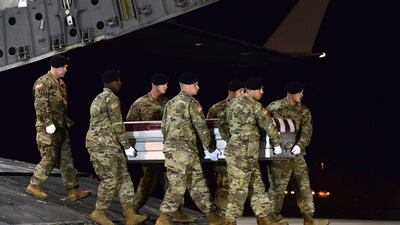Donald Trump’s bungled condolence call to a grieving widow has set off a political firestorm and growing questions about how and why four American soldiers died in Niger.
The Pentagon has launched an investigation as Democrats on Thursday compared the ambush by about 50 ISIL-affiliated fighters earlier this month with the 2012 Benghazi attack that dogged Barack Obama’s second term.
They want to know why Mr Trump waited 12 days to address the deaths before turning the matter into a partisan squabble by bragging about his handling of condolence phone calls.
"This might wind up to be Mr Trump's Benghazi,” said Frederica Wilson, a Democratic congresswoman, who set off the controversy when she revealed that Mr Trump had upset the widow of La David Johnson during a five-minute phone call on Tuesday.
Sergeant Johnson was in the team led by Green Berets that was attacked in what had been deemed a low-risk area as it left a meeting with tribal leaders two weeks ago.
His body was left behind during the initial rescue and recovery operation, and retrieved by local forces two days later.
Mr Trump is accused of being insensitive during a call to Myeshia Johnson.
"He knew what he signed up for ... but when it happens it hurts," he is supposed to have said according to Ms Wilson, who was with Johnson’s widow at the time.
She added that he also appeared to forget the soldier’s name. Her account was later corroborated by Johnson’s mother.
"President Trump did disrespect my son and my daughter and also me and my husband," Cowanda Jones-Johnson told the Washington Post.
Read more: Deadly attack on US special forces highlights terror resurgence in Africa's Sahel
Mr Trump was already on the defensive about the deaths after being quizzed at a news conference on Monday about why he had not telephoned the families. He replied in typical fashion by falsely claiming that Barack Obama and other former presidents had not called relatives of fallen service members.
So when details of the awkward condolence call emerged a day later, critics accused him of lacking empathy and failing to understand the grave responsibilities of being commander in chief.
"He doesn't even know how to sympathise with people,” Ms Wilson told CNN. “We're grieving. This is a grieving community.”
Jeanne Zaino, professor of political science at Iona College, said Mr Trump’s clumsy handling of the phone call was not the real issue. The real issue, she said, was how four servicemen had died on a supposedly routine mission.
“The fact that Trump’s botched handling of this has drawn attention to this may be a good thing, because it may put more pressure on the military and the administration to get to the bottom of what happened,” she said.
The furore also highlighted the role of US servicemen and women in a corner of Africa where few Americans realise their troops are mentoring local forces fighting Al Qaeda and ISIL-affiliated groups.
John McCain, the veteran Republican who chairs the influential senate armed services committee, said the Trump administration had not been forthcoming about what went wrong and is leading calls for more answers.
At first the administration said three soldiers were killed and two wounded when their pickup trucks came under fire. However, officials later said a fourth soldier – Johnson – died after becoming separated from the team.
The circumstances of how he was separated and the nature of his death, as well as why there was no intelligence of a possible attack, are at the centre of a Pentagon investigation.
Officials have also also given different accounts of who flew a medevac helicopter – first saying it was the French military, then the US military and finally that it may have been an American contractor.
The confusion has drawn comparisons with how the Obama administration offered incorrect accounts in the aftermath of the Benghazi attack in which four Americans died, which Republicans cited as evidence of a cover-up.

